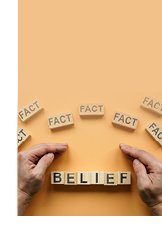Retraining Nerves To Overcome Unfounded Confidence, Imposter Syndrome And Other Phantom Realities
Greetings *|FNAME|*,
 I recently achieved a career milestone: receiving the Florida State University Distinguished Alumni Award, from the College of Education, Health and Human Sciences. It was a deeply satisfying occasion, but it also made me call into question some of my own perceptions. For instance, I frequently perceive myself being positioned firmly in the middle of my career, with many things yet to accomplish. I'm a doer, an achiever, and constantly seeking continous improvement.
I recently achieved a career milestone: receiving the Florida State University Distinguished Alumni Award, from the College of Education, Health and Human Sciences. It was a deeply satisfying occasion, but it also made me call into question some of my own perceptions. For instance, I frequently perceive myself being positioned firmly in the middle of my career, with many things yet to accomplish. I'm a doer, an achiever, and constantly seeking continous improvement.
So in one way, I thought perhaps this award was a bit premature because I still have so much to do. Yet the reality is, I've been building to this point for decades, and it didn't just start out when I founded Change by Design.
Sometimes high achievers maintain a perception of achievement dislocation that is similar to my own. After all, we've been working so hard at it for so long. When success piles up, it all seems out of proportion with our expectations. The National Library of Medicine calls the culprit of these feelings "Imposter Syndrome." It is one possible answer to why, even after earning multiple Bachelors degrees,
a Masters degree, and a Ph.D., then building a successful business over the past 15+ years, I still sometimes wonder when the other shoe will drop. The public recognition contests my slightly misaligned perception though and really provides a fascinating look at how the brain works.
 As of late, I've thought more extensively than normal about how the brain works and its miraculous plasticity. Admittedly, part of it is the award. But another part is even more personal: I've been working with Be Strong Therapy to help rewire my nerves because of severe neuropathy in my feet from Cancer treatments. Even though I initially doubted it would work, my occupational therapist has been applying some cutting edge medical principles, including biofeedback, to bring my feet back to life. In light of Halloween, this might sound like some kind of reanimation of the undead, like zombies. But no; we are slowly activating specific areas of my brain to start feeling sensation again in my toes, by targeting therapies at the interaction between my primary somesthetic cortex and my primary motor cortex. Here's how the therapy works:
As of late, I've thought more extensively than normal about how the brain works and its miraculous plasticity. Admittedly, part of it is the award. But another part is even more personal: I've been working with Be Strong Therapy to help rewire my nerves because of severe neuropathy in my feet from Cancer treatments. Even though I initially doubted it would work, my occupational therapist has been applying some cutting edge medical principles, including biofeedback, to bring my feet back to life. In light of Halloween, this might sound like some kind of reanimation of the undead, like zombies. But no; we are slowly activating specific areas of my brain to start feeling sensation again in my toes, by targeting therapies at the interaction between my primary somesthetic cortex and my primary motor cortex. Here's how the therapy works:
- First I am supposed to touch cold tile floor with my hands.
- Then I put my feet on those same tiles.
- Then I must consciously, mentally expect my feet to feel that cold floor.
 It's incredible to see the nervous system changing and growing first-hand, because the therapy is working! These specific sections of the brain are actively working to feel what they are supposed to feel, even though neuropathy had previously dulled all sensation.
It's incredible to see the nervous system changing and growing first-hand, because the therapy is working! These specific sections of the brain are actively working to feel what they are supposed to feel, even though neuropathy had previously dulled all sensation.
Although it might take a while, repeated efforts in this approach over time are clinically proven to return feeling to the body part(s) that have neuropathy. Besides temperature therapy, we're using several other tools like lasers and spiky dryer balls to help "re-train" my brain to connect the expectations of sensation to the real stimulation from object contact.
Trick or Treat: Unfounded Confidence and Delusion
So is this process of physical "faking it until you make it" one way to leverage visioning into realizing a real, tangible result? We've seen health studies about the efficacy of the placebo effect, like this pay-walled one from National Geographic that explores whether belief has the power to heal. And another article here reviews how lasers can be used for nerve regeneration, similar to what I am personally experiencing. As I ruminated on these, I saw parallels with other learning theories and strategies we use at Change by Design, like Bandura's theory of self-efficacy.
 Self-efficacy is your own belief in your ability to do something specific. Believing that you can do something can lead you to try harder, try more strategies, and persist longer. It also means that IF you fail, you blame it on not trying the right strategy, instead of some external reason.
Self-efficacy is your own belief in your ability to do something specific. Believing that you can do something can lead you to try harder, try more strategies, and persist longer. It also means that IF you fail, you blame it on not trying the right strategy, instead of some external reason.
A person who does not believe they can do something will actually lead to a self-fulfilling prophecy of failure. They will try less hard, try fewer strategies, and not persist as long. And when they fail (which they will), they will also blame it on external reasons, like saying that "they couldn't do it because the cards were stacked against them." Self-efficacy doesn't blame outside factors for failure; it looks inward.
Many people believe they can do something, and work hard at it, even after failure. We celebrate and reward perseverence, right? But that isn't necessarily self-efficacy. If you don't have training on how to do the specific task, including related knowledge, tools, and practice, then you are really just wandering around in the dark. Accomplishing the desired results becomes just a lucky stumble through the right doorway, not a true refinement of abilities. Luck is not science... it's just luck. And willpower plus belief are simply not enough to build skills or self-efficacy. There has to be some rational, factual basis for why you think you can do something.
 You can believe you are able to do something all you want, but there is a comparative element where you must sufficiently understand the steps in a task so that you can self-evaluate against it. Having blanket confidence without that reality check can lead to delusion.
You can believe you are able to do something all you want, but there is a comparative element where you must sufficiently understand the steps in a task so that you can self-evaluate against it. Having blanket confidence without that reality check can lead to delusion.
We can also have several layers of belief. We might believe on the surface that we can do something or that something will happen. We might believe we can do something, but we might have hindering beliefs from our family system or others that are actually stopping us from being successful, hidden underneath the top belief.
Taking Off The False Costume of Success
If we bump up against something that we know we should be able to do or accomplish (like having feeling in my feet), and it's not happening (because of neuropathy), it's useful to work with a skilled coach or therapist to address the root cause. Companies and non-profits that are earnestly addressing repeated performance failures sometimes hire companies like Change by Design to gain a similar outside perspective, and "rewire their nerves.". Together we "believe forward" by developing vision boards, strategic plans, and comprehensive action plans that contain enough detail to cover how the organization will realistically improve effectiveness. That process allows clients throw off unfounded notions of perfection and avoid delusional practices or blind perseverence. They implement meaningful change that actually solves underlying issues.
Remember that there is nothing wrong with believing you can do something. Visioning where you want to go is very much in the belief camp. But developing detailed action plans lets you foresee the steps that must be taken to achieve desired performance. The goals help clarify what effectiveness looks like. As a result, you walk the path to high self-efficacy, even when failure happens. You gain clearer perspective of where you actually stand, whether your business seems to be doing phenomenally, or is encountering performance resistance. And when you win, it's not phantom success, it's the real thing.
Yours truly,


Sue
Email | LinkedIn | V-Card